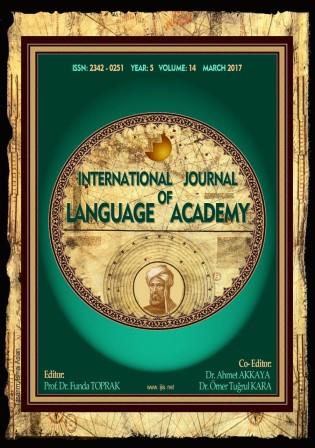Author :
Abstract
Bu çalışma, bütünce temelli aktivitelerin İngilizce kelime öğretiminde etkinliğini incelemiştir. Çalışmanın ana amacı ders kitabı veya sözlükle kelime öğretiminin yerine bütünce temelli etkinliklerle kelime öğretiminin daha etkili olup olmadığını araştırmaktır. Bu çalışmanın diğer bir amacı ise öğrencilerin bu tür bütünce temelli kelime etkinliklerine karşı olan tutumlarını anlamaktır. Bu çalışmada, Türkiye’de özel bir üniversitede eğitim gören, orta seviyede İngilizce bilgisine sahip 28 öğrenci yer almıştır. Katılımcılar kendilerine uygulanan ön-test sonucunda deney ve kontrol guruplarına ayrılmışlar, deney grubundaki katılımcılar bütünce temelli etkinliklerle kelime öğrenimi çalışmaları yaparken kontrol grup ise sadece ders kitabı ve sözlük kullanımına dayalı çalışmalar yapmıştır. Bu çalışma, nitel ve nicel veri toplama araçları kullanılan yarı-deneysel bir çalışmadır. Bu çalışmadaki nitel veri toplama araçlarını bir yeterlilik testi, ön ve son testler ve 12 maddelik 5’li likert tipi öğrenci tutum anketi oluşturmaktadır. Nicel veri toplama araçları ise öğrenci görüşmeleri ve günlükleridir. Nicel veriler betimsel analiz ve bağımsız örneklem t-testleri uygulanarak analiz edilmiş, nitel veriler ise içerik analizi yapılarak incelenmiştir. Verilerin istatistiksel analizi göstermiştir ki bütünce temelli kelime etkinlikleri ders kitabındaki etkinliklerden daha etkilidir. Buna ek olarak, tutum anketine verilen yanıtların analizi öğrencilerin bütünce temelli kelime etkinliklerine karşı olumlu tutumlara sahip olduklarını göstermiştir. Görüşme verileri ve öğrenci günlükleri de anket sonuçlarını desteklemektedir.
Keywords
Abstract
Our study aimed at finding out the effectiveness of corpus-based vocabulary teaching activities as well as students’ attitudes towards concordance-based materials when corpus-based tasks in English vocabulary learning are used. The study was conducted in a preparatory school in a private university. The participants were 28 intermediate level students whose native language was Turkish and they were between the age of 17 and 20. They were placed into two intact groups as experimental and control group as a result of a pre-test. While the participants in the experimental group were taught through corpus-based vocabulary teaching activities, those in the control group were taught vocabulary activities through the tasks in their text book and dictionary. The data were collected through a proficiency exam, pre- and post-tests and a 12 item-questionnaire based on a 5-point Likert scale as quantitative instruments and through interviews and learner diaries as qualitative instruments. The quantitative data were analyzed through descriptive analysis and independent samples t-tests, and qualitative data were analyzed through content analysis by observing themes in students’ responses during the interviews and learner diaries. The statistical analysis indicated that using corpus-based vocabulary tasks were more effective than the tasks in the textbook. Additionally, our findings indicated that the attitudes of the students were positive in the use of corpus-based vocabulary tasks.
